
Editors Note: Today we’re featuring a guest post by Chris Long from The Home Depot.
Tired of being left in the dark when the power goes out? Had enough with throwing spoiled food out and watching the basement sump overflow? As much as our electric utility companies try and prevent this, power outages happen. Violent storms, earthquakes, ice storms and even just plain grid overload can mean a power loss for days, even weeks at a time.
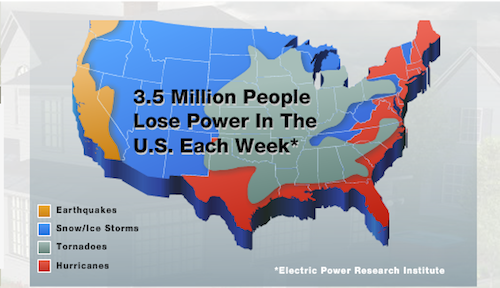
Don’t be a victim. We can prepare for these events by generating our own power until the grid comes back online.
Generate my own power? That sounds complicated. Visions of roof-mounted solar panels and a back yard full of windmills aside, we are really only talking about temporary situations where a small engine-powered generator will suffice. Let’s break this down into two major categories: automatic standby generators and portable gasoline generators.
Automatic Standby
Automatic standby generators offer the best (but most expensive) solution to unreliable utility power.
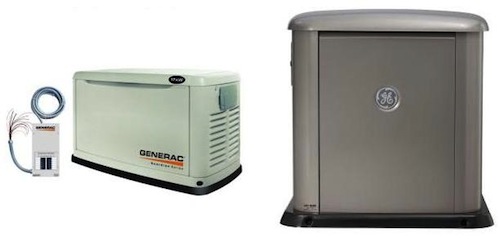
These units mount on a pad near your home, run off natural gas or propane, and are permanently wired to the electrical system. They monitor utility power and automatically take over whenever grid power fails. You don’t have to be awake, or even at home for these units to operate. All automatic standby generators use a transfer switch to isolate your home from the grid during operation and reconnect to the grid when utility power returns.
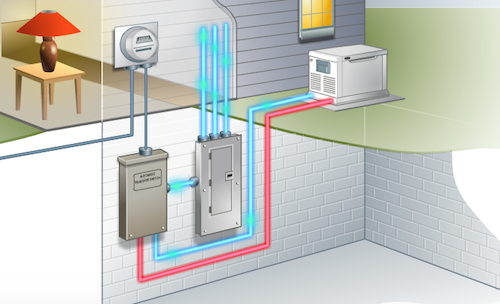
Some of these units include a transfer switch designed to power only select circuits in your main panel. You get to choose which items are covered when the switch is installed, within the circuit number and amperage limits of the generator.
Another type of automatic standby generator uses a “load shedding” style of transfer switch. This type supplies power to all circuits in the home and selectively turns off circuits only when more power is demanded than the generator can safely supply. You choose the circuit priority when the generator is installed.
Due to the plumbing for gas pipe and the installation work at the meter and service panel, these generators are not considered DIY installation projects. A building permit and inspection will be required for these permanent installations.
Portable
Powered by a small gasoline engine, portable generators offer an inexpensive way to power essential home appliances for short periods of time.
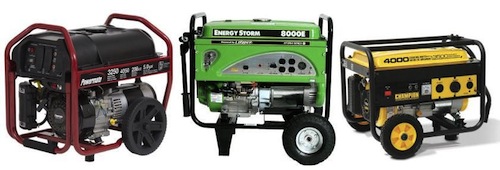
Wheeled out of storage, portables are set up outside where exhaust fumes will harmlessly dissipate. Extension cables run into the home to power appliances, sump pumps, etc. Obviously, someone needs to be home to set up, run and refuel portable generators. Smaller models have manual start recoil pull cords like most lawnmowers. Larger models will offer electric starting, using a battery much like a lawn tractor.
Will you be powering computers, home electronics or other sensitive equipment? All automatic standby generators and a few specially built portables provide filtered sine-wave power at low harmonic distortion levels. The portables with low distortion or “clean power” will definitely mention this in their list of features, as it adds to the cost.
Hardwired loads are not powered by these units, so things like lights, outlets and furnace motors don’t work when the grid is down. One increasingly popular portable generator option is a combination transfer switch and exterior outlet box.
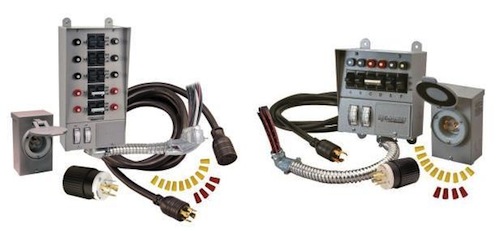
Plug one heavy duty cable from the generator to the outlet, and the manual transfer switch can now power home circuits. No more extension cords snaked all through the home, and you can use light switches, outlets and that essential furnace motor as well. A licensed electrician can install these switches for you.
Size Matters
Hopefully by now you have a good idea about which type of generator you want. The next question becomes – what size generator do I need? Let’s look at the chart below for determining portable generator power sizing:
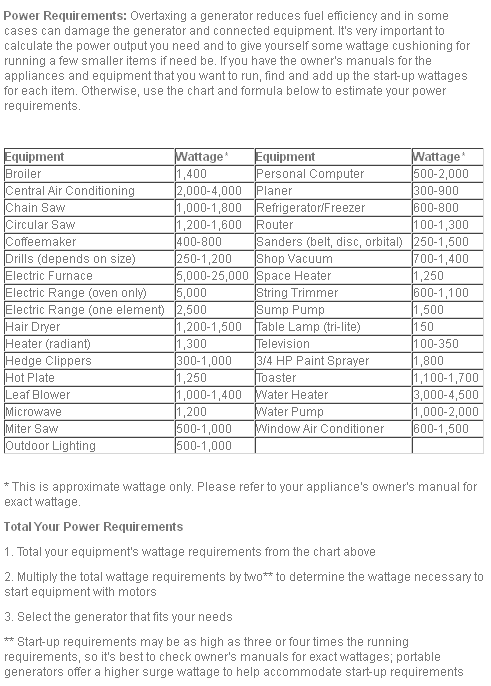
The sizing requirements for automatic standby generators are based on the load capacity of all the circuits to be connected. Your installer will analyze your power needs and go over generator sizing options with you.
I hope this guide has been helpful. Let’s keep the beer cold and the basement dry!
Chris Long is a store associate at a Home Depot in the Chicago suburbs. He has been helping customers since 2000, and writes on electrical topics ranging from light bulbs to circuit breakers.







Which of these would you recommend for an urban dweller that experiences one major power outtage (lasting several days) every 5-10 years and a few minor ones (lasting several hours) once or twice a year?
I would definitely suggest a portable model since the major outages are so infrequent, and they carry a lower price tag. The minor outages you can probably weather by not opening the fridge / freezer as long as there are no other major systems that need to be powered.
I’ve always wanted a portable generator. Maybe this is the push I need to finally go get one!
Depending upon your area, you might also want to consider visibility and noise. Particularly if your power outage is secondary to a disaster that might cause looting, or attract attention from neighbors or in-laws that you don’t want trying to mooch off your preparedness. Portable generators can be better hidden before use, but they’re often much louder and more recognizable once they’re put to use. They have to be run outdoors, unless you rig of some pretty good exhaust plumbing for a semi-permanent location. Standby generators are often quieter, and there are noise attenuated enclosures for many of them that muffle the sound even more. On top of that, standby generators can be run in an outbuilding that’s properly ventilated to further block sound. The outbuilding route would also help conceal the presence of a standby generator to visitors or nosy neighbors who would otherwise notice a pad and generator enclosure in your back yard. If you’re not on natural gas, propane tanks can often be buried for a lower profile. Diesel and gasoline in any large quantity take up space, pose a fire hazard, and can be very conspicuous if you have guests or workers around your home. I’m not one to talk with friends and family in detail about any disaster preparations I’ve made, lest I be their first stop when their poor planning lands them in trouble. I want to be able to INVITE people into my home, not be forced to take them in. I also don’t want to alert thieves to the possibility of equipment, fuel, or other preparations they could steal, either before or after a disaster. Standby generators are pricey, but it’s about the only route for whole-house power if that’s what you need. I also like the instant startup and simplicity, so even kids and spouses don’t have to worry about getting a portable generator set up, started, or refueled if I’m not there.
Noise is a major concern and the installed models are typically MUCH quieter for all the reasons you mentioned. In fact, they can be installed so quiet that you really can hardly hear them running…. Definitely a consideration. In our neighborhood, about 1/2 the homes fire up generators when the power is out – and it’s really loud, so I don’t mind if ours contributes to the noise pollution. I think investing in a good pair of ear plugs for just such a situation might make sense.
Fuel is another consideration. I don’t know what the price of propane is, but diesel and gasoline are pretty expensive. I don’t know how the fuel efficiencies compare between the four different fuel options, especially when you consider the prices of the fuels. For instance, what’s the bottom line on cost to generate 1kWh from each of the 4 major fuel options?
I can’t answer this question, but I know that a typical propane generator to power a whole single family home in the Summer (including air conditioning) can run as high as $70 / day…. I know that our portable jobby was running us about $40 / 24 hours just to keep a few lights on and a refrigerator…. But the cost is significantly different. Figure $5,000 minimum for a whole-house installed model, and $600 for a 5,000 watt portable. For me, the portable makes the most sense. We lose power once a year for a period of time where I need a generator (say, 12 hours or more)…. The ROI on an installed model just doesn’t make sense.
If you’re in an area with primarily underground utilities, a fantastic power company or EMC, and not prone to significant weather-related disasters every year, I can see the portable being a better choice. However, standby generators are like insurance. You don’t always get them because you EXPECT to have to use them. You can possibly justify a whole-house generator if you think not about the odds of needing it, but about the risk of not having it if you DO need it. If power is out for a week instead of a day, you CAN get by on a portable 5-8k watt model. But what about in the winter, when snow and ice can not only create the week-long (or more) outage, but also increase the need for power for heating? A lot of people are on all-electric HVAC systems. Keeping a weeks’ worth of fuel for a portable generator would be difficult, based on space alone. A weeks’ worth of propane can be stored in an underground tank. A weeks’ worth of natural gas doesn’t even have to be stored. Any family with members who have special needs should automatically consider a standby generator over a portable.
Those stats are pretty alarming to me. For awhile now I’ve had a friend tell me it’d be a good idea to have a generator, good amount of cash, and some water and canned food on hand in case of an emergency…and I think I’m starting to believe it. I wouldn’t say I’m a paranoid fella but it wouldn’t take much for cell towers or credit card processing to go down and put a lot of people in need.
Sometimes its hard to think of a doomsday scenario that results in a water shortage; but I suppose its possible. For folks on well water its a very real possibility around here… But in my 32 years I’ve never seen a systemic water shortage (a main break here and there, maybe, but nothing more than a day or two)… If something really put our municipal water out, I think we’d have a real crisis on our hands.
Happens all the time, especially as infrastructure ages and municipalities struggle to find the funds to replace it. Imagine a 36″ or 48″ water main rupture. That not only drops service to a massive area, it contaminates a large amount of the area that still gets adequate service. In the metro Atlanta area, we’ve had water outages or contaminations that last a week or more. Boil-water warnings for two weeks aren’t common, but I’ve seen a few. While a generator won’t help you get water if there’s none coming to your home, if you have a power outage AND a water contamination (say, a ruptured main causes a sink hole that downs power lines), you’ll need the power to boil water. In the case of hurricane prone areas, they often have contaminated water for a while, and no power to boil it.
Who among us is planning on using our routers/planers/circ saws WHILE the power is out? Classy that they’re included in the table of wattages, but funny. Thanks for the post!!
Not as far fetched as one might think – what about for post-storm repairs while the power is still out?
Fair enough 🙂
Things like power tools are listed for contractor’s information. Lots of contractors use generators to do the preliminary work before the power company provides an electrical hookup at the job site. That way they can get started sooner.
You are welcome poiboyf.
Yes, the chart I listed does have tools and other power equipment included primarily for contractors. In fact, there is an entire category of portable generators targeted just for contractors. Much like the difference between homeowner grade and professional power tools, these generators will have engines with a much longer service life, be designed for frequent and continuous use, and are priced accordingly.
The route to go if you’re interested in conserving gasoline when runnning a generator is to get a unit that generates DC power instead of AC. The DC units create DC power to a battery then through an inverter where DC is converted to AC. These units don’t have to run at constant RPM like the AC generators because they only speed up as demand increases. AC generators must run at constant RPM to keep the sine-wave of the produced power consistent as required for more delicate applicances like computers and higher end stereo equipment. The result is that a unit that (comparing typical name brand 6.5 kW units…Honda for DC generation and Briggs for AC generation) burns 1 gallon every 3.1 hours instead of a unit that burns that gallon in 1.4 hours.
Anyone know of a portable that runs on propane? Like a forklift or Zamboni sized tank. A person could have a transfer switch and a cheaper generator but not have to worry about stabilizing or draining the gas all the time and have longer run time with a bigger tank.
Hey jeff_williams.
Yes, there are portable generators which run on propane. At homedepot.com, you will currently find a dozen of them, with one that is dual fuel capable, (propane or gasoline). They are sold with the intent of using 20-30# portable tanks like the ones used with gas barbeque grills or RVs. I see no reason why a tank made to mount on a forklift would not work as well, but I have never checked whether the gas line connector is the same. You can find them here: http://v.gd/dRWAiP Just click on propane as the fuel type.
Good info from Chris and Brady above. Living in the upper midwest, a generator could be a definite need. I’d chain a portable down, and keep a close eye on it.